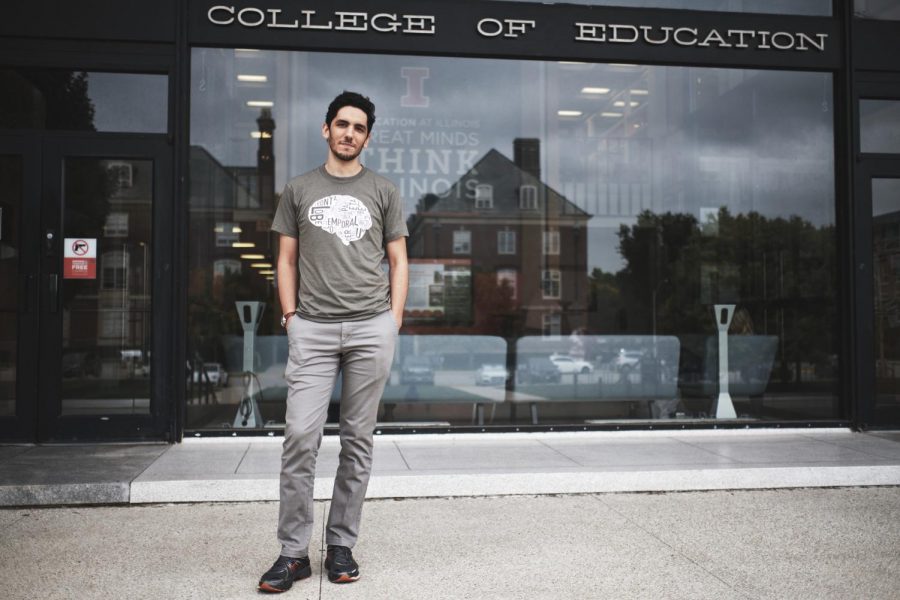UI Counseling Psychology Program ranks top in nation
Amir Maghsoodi, a second-year doctoral candidate in the counseling psychology program whose office is located in the College of Education, stands in front of the College of Education Building. The program for doctoral students was recently ranked among the top of the nation.
September 9, 2019
With a small faculty line accepting only a maximum of three students a year, the University’s Counseling Psychology Program for doctoral students was recently placed at the top of national rankings.
Accredited by the American Psychology Association, the program trains psychologists to apply knowledge developed in the field to issues of practical importance.
Amir Maghsoodi, second-year doctoral student in counseling psychology, said he would not have considered the University’s program without its accreditation in APA.
With APA, the program allows students like Maghsoodi to connect with various programs across the nation sparking discussions of today’s pressing issues with respect to culture, ethnicity and race, Maghsoodi said.
Its affiliation with APA allowed the program to expand to its status today with the support of counseling psychology’s former director of training, Helen Farmer.
Get The Daily Illini in your inbox!
“When I got there, we were including students who had no background in psychology, and so we changed that,” Farmer said. “When you decide to only choose students who qualified at the national level, then you are able to advertise your program nationally. That made a difference.”
Farmer established the program’s visibility to APA in the 1970s and 1980s, attending the association’s annual conference with her doctoral candidates.
Pressing for a stronger emphasis on research, Farmer said research opened the opportunity to open the program to a larger international system outside of the local community.
As a division in the College of Education, counseling psychology at the University focuses on psychological adjustment issues many face throughout various transitions of life.
When applying to programs, Maghsoodi said he was advised to avoid basing his judgment on rankings as they often lack the ability to capture all the aspects of a university.
Despite his prior advice, Maghsoodi said he is glad the program reflects his experience with counseling psychology at the University.
“It feels wonderful to have our program to be ranked highly, and I’m happy that it’s also reflective of my experience here — that I really feel like I’m in really good hands,” Maghsoodi said. “I feel that I can trust my advisers, whether it’s research or clinical supervision or professional development.”
James Rounds, professor in Education, said at the end of each student’s program, candidates spend one year at a nationally competitive internship designated by the APA. In many cases, students of the program are able to work at their first-choice internship.
Across the span of 30 years, the division has downsized to fewer faculty and students to “as small as we can get to continue a program,” Rounds said.
Partly due to budgetary restraints in Education, Rounds said there are both advantages and disadvantages to its compact program size.
With restrictions on the number of courses available to students and students accepted to the program, faculty members are found balancing increased administrative responsibilities with their core focus in teaching and research.
“When you are in an academic department, research is fairly important in terms of advancement,” Rounds said. “And so you’re both doing a lot more administrative work, which takes some time away from your primary roles hopefully teaching and research.”
Without an undergraduate and master’s program, counseling psychology is unable to bring in enough funds to expand the division’s overall size relying on the College of Education’s support.
“One of the difficulties that faces a lot of professional programs here at the University is that they need to either develop or find some way to develop a more stronger undergraduate presence or master level,” Rounds said. “Master-level programs at the University are bringing tuition money.”
While the division hopes to establish a master’s program, Rounds said a new degree program at the University takes two to three years to get off the ground.
Despite having the downside of not having a large cohort of fellow counseling psychology students, Maghsoodi said he appreciates the intimate relationships he established with professors and students.
Maghsoodi said counseling psychology put a large emphasis on social justice issues opening discussion and research on how the field of social science can respond to a social environment dealing with such conflicts.
“When you think about our field as a social science, responding to the social environment, that social justice is a really great essential part of your identity to have,” Maghsoodi said. “Illinois’ program here especially is, from what I’ve seen, from what I’ve heard talking to other students, I think it’s a leader, like this program leads in that respect, and I love it.”
Inspired by the students and faculty within counseling psychology, Maghsoodi said his identity as a psychologist and career path has changed and broadened.
“I’m inspired by the students (and) their energy. I’m inspired by the faculty,” he said. “It’s just been inspirational, motivational for me to be with these people. So it’s really the people here (who) have had made a huge difference for me.”







